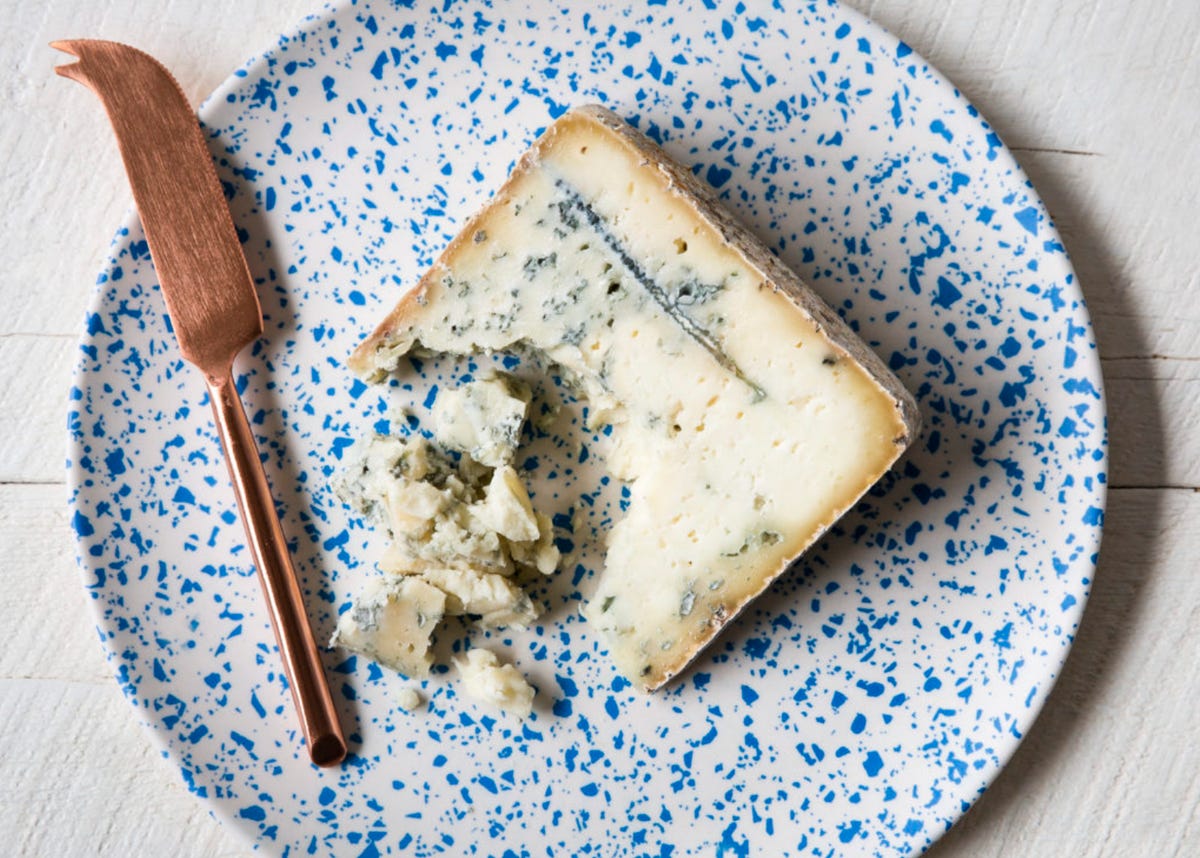
Posted on 08/06/2025 11:27:08 AM PDT by Red Badger
Plastic wrap may seem convenient, but it shortens your cheese's shelf life.
Think twice before wrapping your cheese in plastic and tossing it in the fridge. If you want your favorite block or wedge to stay flavorful and last longer, how you store it matters - a lot. Most people unknowingly shorten the life of their cheese by sealing it in airtight plastic, which suffocates the product, ruins its texture and dulls its taste.
Instead, take a cue from the pros. We spoke with John Montez, certified certified cheese professional lead at Murray's Cheese in New York, who shared how to keep any cheese - from brie to cheddar - fresh for weeks. His number one tip? Skip plastic wrap altogether. Cheese needs to breathe, and wrapping it in wax paper or parchment followed by a loose layer of foil or a container is the best way to keep it tasting like new.
"Cheese is a preserved product," Montez says. "It's high in acid and salt, with much of the moisture removed. It's rare you'd need to throw out a properly stored piece." Translation? Treat your cheese right and it'll reward you with long-lasting flavor - no waste, no stale bites, just the perfect snack when you need it.
With Montez's help, here's everything you need to know about cheese, including how to store cheese, the best way to cut cheese and how to store cheese -- even the fancy kind -- so you never have to waste any.
Cheese is a living thing

A little extra mold on your cheese should not deter you from hanging onto it. Just scrape it off with a knife and carry on. - Murray's Cheese
===============================================================
Certain cheeses, like blue cheese, wear their mold more proudly than others, but it may be helpful to think of cheese as the controlled decay of milk and know that there's pretty much always mold involved regardless. The snowy-white rind of brie and other bloomy-rind cheeses are a type of mold, as is the mottled outer surface of a firmer cheese like Gruyere. Fear not. If you've ever taken a probiotic, you already inherently understand that not all microbes are bad.
Read more: Fake Parmesan Cheese Is a Bigger Problem Than You'd Think
This is all to say that, first of all, a little extra mold on your cheese shouldn't deter you from hanging on to it. "If you see it molds up a little bit, generally you can scrape off that mold and it's no problem," says Montez. Because of the lack of water content in cheese, food mold can't penetrate it very deeply like it would with many other food products. "Look out if it's black mold or something like that," he says, "but the thing is, it's rare that a piece of cheese becomes unsafe to eat. It's going to become unpalatable to you long before it's unsafe."
Cut your cheese so it's easier to store
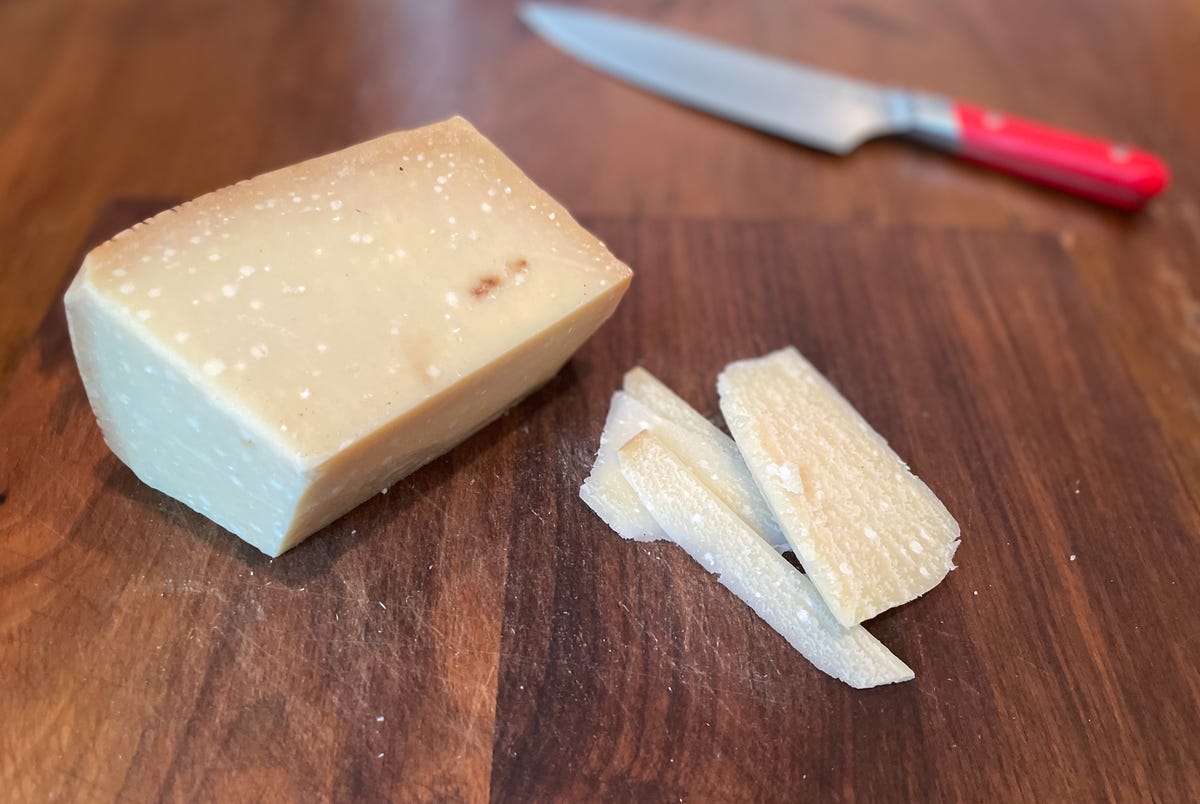
Precise cuts that leave flat surfaces make it easier to wrap your cheese so it doesn't spoil. David Watsky/CNET
===================================================================
Keeping the cheese palatable, then, is the real goal. How you store your cheese is going to have the biggest impact on its longevity -- but how, when and what you cut it with can also play a part in its ongoing flavor and texture success. Precise cuts that leave flat surfaces make it easier to wrap in the most effective manner, and keeping the cheese whole for as long as possible is also helpful to its longevity.
"Minimizing the surface area (exposed to air) is going to prevent cheese from drying out or getting moldy," says Montez. "So, for example, if you're going to prep cheese ahead of time for a party, the longer you can leave it as a whole piece, the better," or if you're a habitual meal-prepper, resist the urge to cut up a whole chunk of cheese for easier access, and just cut as you go.
As for making clean cuts, "you can get done pretty much any job you need to get done with a chef's knife," says Montez. "When it comes to softer cheeses, a skeleton knife is good to have as something that reduces the knife's drag, or a wire-based cheese harp which is used in a lot of cheese shops. Nowadays, you can even find cheese boards that have a built-in wire. These are really good for leaving as much of the rind intact on bloomy rind and other soft cheeses as you can."
Wrap your cheese, but don't use plastic

- block of cheese wrapped in parchment paper - There is specialty cheese paper you can buy, but butcher or parchment paper will work just as well. David Watsky/CNET
========================================================================
One of the two main goals when wrapping and storing cheese is to allow a little bit of airflow so that your fancy cheese can still breathe. "The main idea here is you don't want to wrap it in plastic," says Montez, "There are a lot of active microorganisms in cheese and you want to keep them alive by the time you're going to eat it."
If this piece of advice makes you wonder why the wedge of precut cheese you bought was in plastic wrap, the answer is marketing. "It's mostly for display purposes," says Montez, since you're not likely to buy what you can't see. "There are cheese shops where they exclusively wrap in paper, but that's rare. If you're a big shop that moves a lot of product, it's not a problem if you know if the cheese is wrapped in plastic for a couple of days, but beyond that, it can be bad for the cheese."
You can extend the life of your artisanal cheeses by rewrapping them in paper after you bring them home. "Formaticum makes great cheese paper that is specially formulated to keep the outside from drying out while allowing the cheese to breathe," says Montez. "If you don't have cheese paper, wrapping it in wax paper, parchment paper, butcher paper or whatever you have is good."
Formaticum makes excellent cheese storage bags and wrapping paper. Formaticum
=====================================================================
It can take some serious practice to achieve the crisp folds of experienced cheesemongers with cheese paper. To help, think of your cheese as a little present (which it is, obviously), and wrap it as though you were using festive wrapping paper. "You want the paper making contact with the piece of cheese," says Montez, "so crease as you go, and make sure all of the faces of the cheese are contacting the paper in an even, flat way." If this seems at all intimidating, Formaticum also makes handy, cheese storage bags where no origami-level folding is required.
How and where to store cheese so it lasts longer
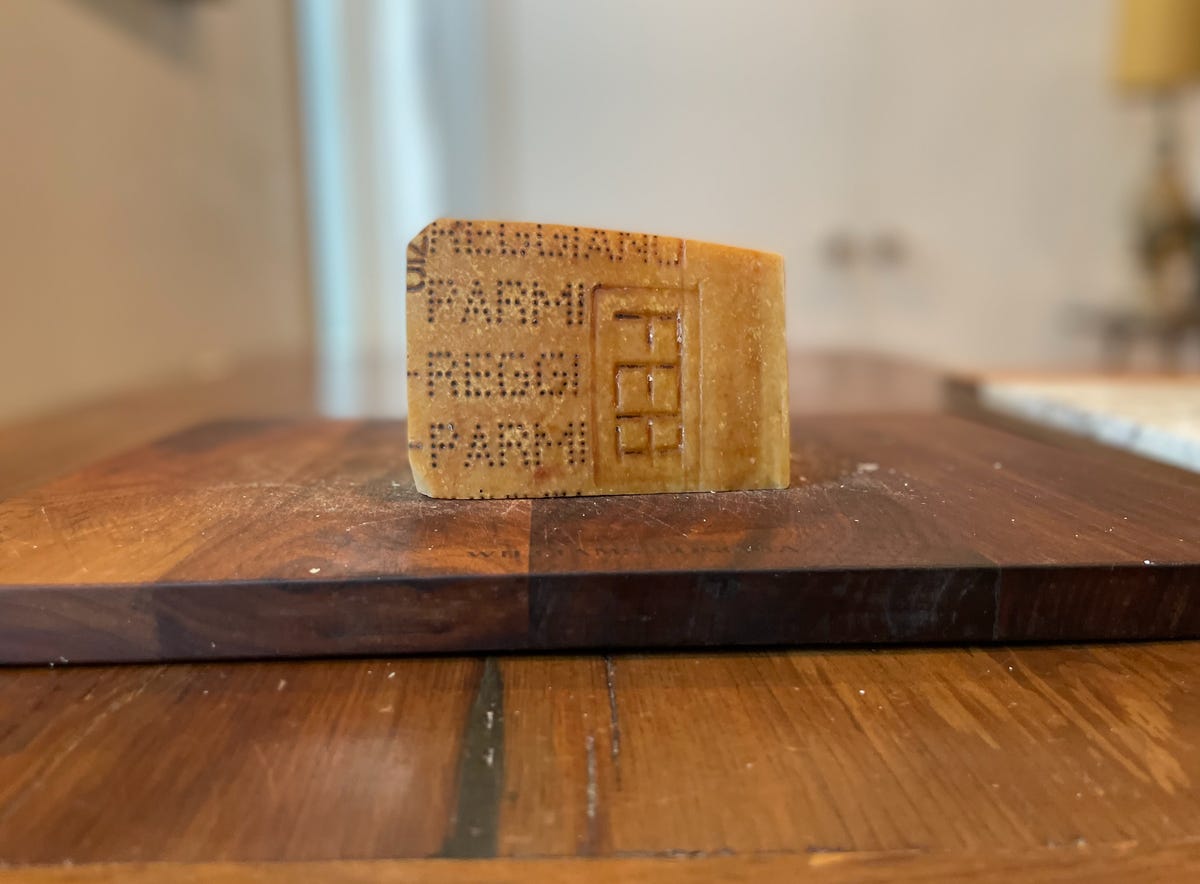
rind of Parmigiano Reggiano cheese on cutting board - Cheese you intend to consume within a couple of days doesn't necessarily even need refrigeration. And real Parmigiano Reggiano never needs to see the inside of your fridge. David Watsky/CNET
=======================================================================
"What you're really trying to accomplish when you store cheese is keeping the cold air from the refrigerator from blowing on it, because that's going to cause it to dry out more quickly," says Montez. Wrapped cheeses should either go into a drawer within your fridge, into a corner where the fan doesn't entirely reach, or even in a small container with the lid cracked to keep air circulation available.
Hard cheeses, or even some softer cheeses you intend to consume within a couple of days, don't necessarily even need refrigeration. You can simply seek out something to cover them such as a cheese dome, or for the truly committed, a cheese grotto. According to Montez: "Parmigiano Reggiano never needs to see your refrigerator. You can keep it pretty much indefinitely at room temperature." I guess that answers the question a user had on the r/AskCulinary subreddit about freezing cheese -- you can do it but you don't have to.
For more food and drink storage tips, here's how long an open bottle of wine will last and how to store your eggs for optimal freshness.
FAQs
Why don't I want to wrap my cheese in plastic?
Cheese is a living organism -- wrapping it up in plastic kills those good microorganisms you want to keep propagating before you eat your wedge. Instead, package your cheese so that it has some airflow.
What if cheese comes wrapped in plastic?
You can unwrap the cheese and rewrap it in cheese paper at home for optimal freshness.
Do I need to throw away moldy cheese?
Not at all. You can scrape the mold off the top layer, and the rest of the cheese is perfectly safe for consumption. Cheese is a living organism, and it's an ecosystem composed of many microbes. It's normal for mold to grow on the surface from time to time.
Cheese Ping!.........................


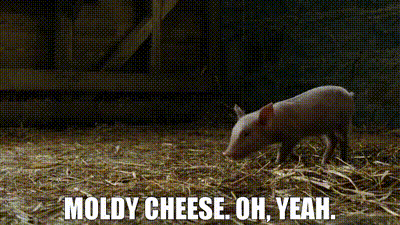
All cheese is old. Else it wouldn’t be cheese..............
Wensleydale?
Expect some in next Tuesday.....................
Works for hard, solid cheeses (but cut, rather than scrape). I wouldn't do this for soft or porous cheeses. And remember, like cancer, make sure you get the margins.
We use plastic wrap and rarely have a problem.
Cheese is supposed to last FOR DAYS? Who knew? ;)
Just don’t cut the cheese when other people are around.
Tillamook cheese reccomends wraping in parchment and then plastic. The plastic prevents unwanted other flavors from being absorbed.

First requirement of cheese storage: have cheese.
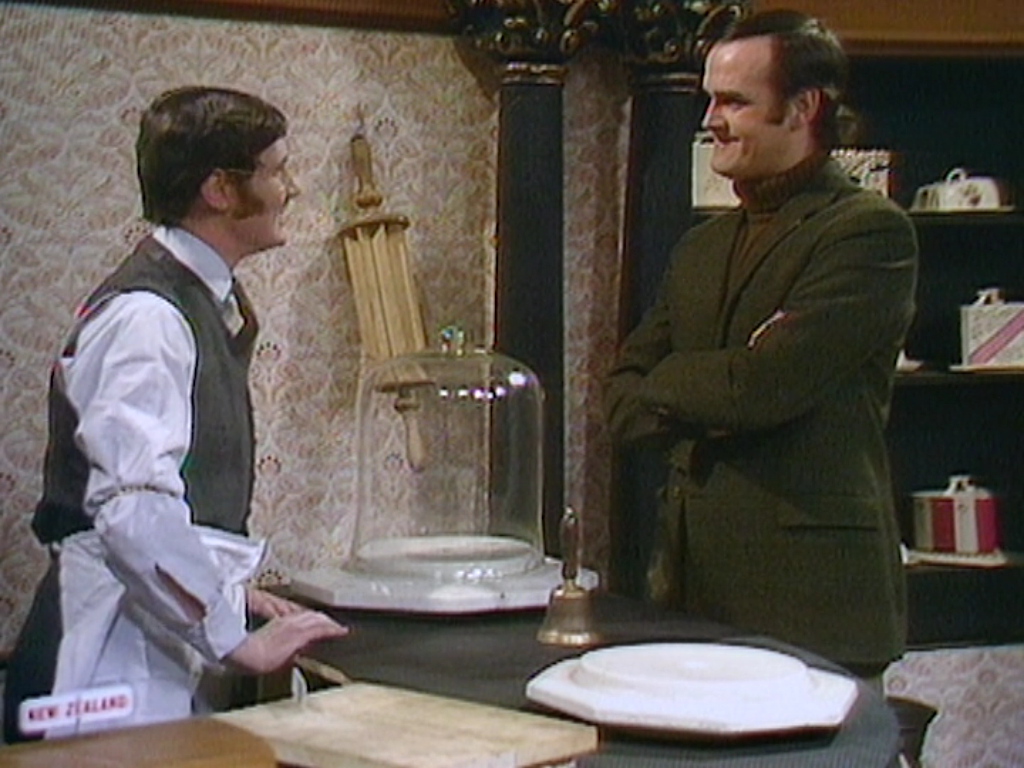
I just threw out a out a quarter pound of Aldi’s sliced pepper-jack because it had mold on it..........
Good to know. Thank you.!
Beat me by 50 seconds!

It took nine minutes for this thread to get a Monty Python post. We’re slipping.
Disclaimer: Opinions posted on Free Republic are those of the individual posters and do not necessarily represent the opinion of Free Republic or its management. All materials posted herein are protected by copyright law and the exemption for fair use of copyrighted works.